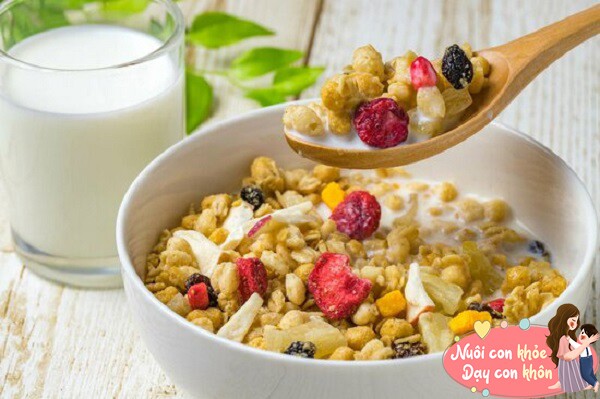With the rise of health issues such as obesity and diet-related diseases, modern parents are increasingly focused on providing their children with healthy foods.


Why is choosing healthy food important for children?
Simply put, healthy food provides the body with essential nutrients without harmful or unhealthy ingredients.
They typically include groups of natural, vitamin-rich, mineral-rich, and fiber-rich foods, while being low in or free of sugar, salt, saturated fat, and preservatives.
Therefore, choosing healthy foods helps children develop physically and intellectually and profoundly impacts other aspects of life.
A balanced and nutritious diet provides children with the energy they need to learn and play, maintaining focus and vitality throughout the day.
Children require adequate nutrition to support the development of bones, muscles, and other organs. For example, calcium from milk and dairy products strengthens bones, while protein supports muscle and tissue growth.

Choosing healthy foods helps children develop physically and intellectually.
Consuming healthy foods also boosts the immune system and lowers the risk of diseases. Children who get enough vitamin C, vitamin D, and antioxidants from natural foods are better equipped to fight infections and illnesses.
In addition to physical benefits, diet also influences children’s psychology and behavior. Studies show that children who eat healthily tend to have better moods and lower anxiety and depression rates than those who don’t.
A sensible diet helps balance hormones and improves mood, thereby aiding children in their studies and social interactions. Moreover, when children are exposed to healthy foods from a young age, they are more likely to develop healthier eating habits throughout their lives.

The role of milk in children’s nutrition and growth
Milk is an essential source of nutrients for children’s development. However, not all types of milk meet nutritional requirements.
Mothers should choose milk fortified with Medium-Chain Triglycerides (MCT), a type of fat that is easily digestible and absorbable, providing quick energy for children. MCT not only helps stabilize children’s energy levels but also supports brain development.
Additionally, components like Calcium, Iron, Zinc, Lysine, and Vitamin D3 are crucial. Calcium strengthens bones and supports cardiovascular and nervous system functions.

Milk is an essential source of nutrients for children’s growth and development.
Iron is essential for producing hemoglobin, which carries oxygen in the blood, while Zinc plays a vital role in boosting immunity and promoting healing.
Lysine, an essential amino acid, supports muscle growth and enhances calcium absorption. It also contributes to hormone and enzyme production, facilitating holistic development. On the other hand, Vitamin D3 aids in efficient calcium absorption, maintains bone health, and strengthens the immune system.
Choosing the right type of milk is part of a child’s balanced diet. A diverse and rich diet helps children grow taller and supports optimal brain development.

Top 4 Healthy Foods for Children’s Well-being
Low-Sugar Milk
Low-sugar milk has a milder sweetness and is easier to drink. Additionally, it has fewer calories while still providing sufficient energy for daily activities, reducing the risk of dental issues.
When children develop a taste for low-sugar milk, they are more likely to accept other low-sugar foods in their diet. This helps establish healthy eating habits from an early age and reduces the risk of future diet-related diseases such as diabetes and obesity.
Besides the health benefits, giving children low-sugar milk has a positive impact on their psychology. Children will feel more confident knowing that they are choosing foods beneficial to their health.

Low-sugar milk has a milder sweetness and is easier to drink.
Fresh Fruits and Vegetables
Fresh fruits and vegetables are essential in daily meals, especially for children. They provide the vitamins, minerals, and fiber necessary for their growth and overall health.
Fruits and vegetables are rich sources of critical vitamins like vitamin C, vitamin A, and B-complex vitamins. Vitamin C strengthens the immune system, while vitamin A is essential for eye and skin health.
Minerals such as calcium, iron, and magnesium are also abundant in fruits and vegetables, playing a vital role in bone development and bodily functions. The fiber in fruits and vegetables improves digestion and prevents constipation.
Whole Grains
Whole grains are packed with vitamins, minerals, and fiber. They provide B-complex vitamins, iron, magnesium, and zinc, all of which are necessary for bodily development and function.
One of the standout benefits of whole grains is their ability to make children feel fuller for longer. The fiber in whole grains slows digestion, helping children stay satisfied for extended periods.
Whole grains can be prepared in various tasty and appealing ways for children, including whole-grain bread, oatmeal, and breakfast cereals…

Whole grains are rich in vitamins, minerals, and fiber.
Lean Protein Sources
Foods such as chicken, fish, tofu, and nuts help build and repair muscles.
One effective way to encourage healthy eating habits in children is to involve them in the food selection and preparation process. Parents can take their children grocery shopping and let them choose fruits, vegetables, and other healthy options.
Choosing healthy foods for children is one of the essential responsibilities of modern parents. By providing children with healthy foods like low-sugar milk, fruits, vegetables, and whole grains, parents set the foundation for their children’s healthy eating habits and overall well-being.
Remember, good nutrition is not just about one meal choice but a lifelong process of fostering positive habits.
|
Nutifood GrowPLUS+ Low Sugar has 20% less sugar* while still tasting great and appealing to children. With the FDI formula from the Nutifood Nutrition Research Institute in Sweden, combined with quickly metabolized MCT fat to help children gain weight and height effectively. Nutifood GrowPLUS+ Low Sugar – Nutrition for Children, Taste for Children.
|




































